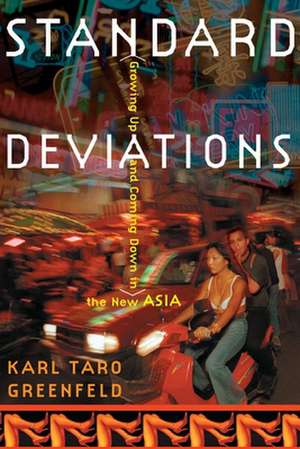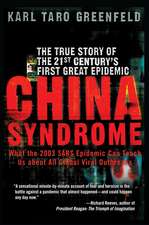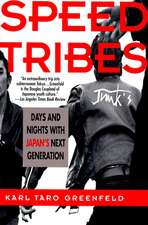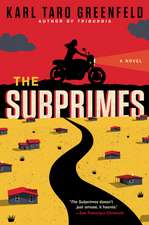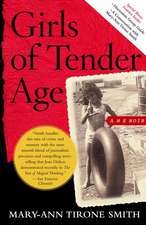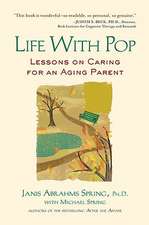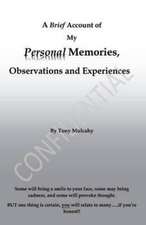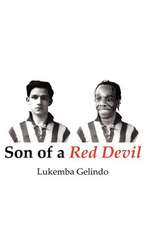Standard Deviations: The Rise and Fall of Rock Radio
Autor Karl Taro Greenfelden Limba Engleză Paperback – 30 iun 2002
In the late 1980s, not long out of college, Karl Taro Greenfeld found himself stranded in New York, a failed writer before his career had even begun. His Jewish-American father angrily cut off support; his Japanese mother suggested he go to Japan to teach English. He did, accepting a job with no more promise than he’d had before. But he stayed in Asia for the next several years, working his way through a series of journalistic posts, watching a culture erupt before his eyes and facing his own demons. Through a series of vividly imagistic stories that range from the rigidly journalistic to the deeply intimate, Standard Deviations recounts Greenfeld’s experiences—both professional and personal—during Asia’s wild ride at the end of the twentieth century. Whether drinking Japanese cough syrup to get high with other Western expatriates, visiting a free-sex ashram in Bombay, or watching a former high school pal self-destruct as an equity analyst in Jakarta, Greenfeld evokes the spirit of a continent in flux at an explosive “bubble” economy’s end—and a man confronting his own identity and aspirations.
Raunchy, insightful, eloquent and moving, Standard Deviations is an uncompromising work of cultural observation and self-exploration.
From the Hardcover edition.
Preț: 114.69 lei
Nou
Puncte Express: 172
Preț estimativ în valută:
21.95€ • 22.97$ • 18.16£
21.95€ • 22.97$ • 18.16£
Carte disponibilă
Livrare economică 17-31 martie
Preluare comenzi: 021 569.72.76
Specificații
ISBN-13: 9780812992694
ISBN-10: 0812992695
Pagini: 272
Dimensiuni: 155 x 228 x 19 mm
Greutate: 0.41 kg
Ediția:Villard
Editura: Villard Books
ISBN-10: 0812992695
Pagini: 272
Dimensiuni: 155 x 228 x 19 mm
Greutate: 0.41 kg
Ediția:Villard
Editura: Villard Books
Notă biografică
Karl Taro Greenfeld is the editor of Time Asia and author of Speed Tribes: Days and Nights with Japan’s Next Generation. A former correspondent for The Nation and writer for Time, he has also contributed articles to GQ, Outside, Vogue, Condé Nast Traveler, The New York Times Magazine and other publications. He lives in Hong Kong with his wife and two daughters.
From the Hardcover edition.
From the Hardcover edition.
Extras
THE BIG LIFE THE BIG LIFE
As an English teacher in a Japanese high school, I stand before stuffy rooms crammed with kids who desultorily practice English on me three classes a day, five days a week. I went to college, I graduated, I came here to Kugenuma, to a little Japanese beach town at the end of a two-car commuter line that snakes through other tiny towns. My apartment is a pair of six-tatami-mat rooms next to a pebbled, weed-strewn parking lot. The narrow-gauge train clangs by on the other side of the lot. I live exactly at the midpoint between two stops. In the mornings I tune the radio to the Armed Forces Network. Disc jockeys from the American base at Yokosuka give public-service announcements between Bon Jovi songs, reminding servicemen that even though they live overseas, they still have the right to vote and that it is important to keep firearms properly cleaned. I am lonely. I have never been so lonely.
One weekend I take the bullet train down to Kyoto to see my grandmother. When I get there, I call a girl I know, an American named Kirstin who has brown hair and green eyes the color of mold on a penny. We meet for dinner. She talks about all the friends she’s making and how much fun she’s having in Japan. She takes me to a bar where everyone—American, Japanese, Australian—knows her. She is beautiful and the center of attention. During the train ride down, I had fantasized about kissing her, about making some sort of connection with her and finding a soul mate, and then, I don’t know, I would take this train down every weekend to see her. We would fall in love.
Instead I go back to my grandmother’s house and spend the rest of the weekend eating sweet bean cakes and watching Japanese baseball.
Stuck is how I’d describe myself. But I am just becoming sufficiently aware of my own condition to put words to it. My friend Drew, he’s living a similar life, and like most people living shitty lives, he’s unwilling to analyze exactly why it’s so awful because that would be a tacit admission that something is going wrong. On weekends we drink in bars or guzzle bottles of cough syrup. The best cough syrup, a brand called Sariam, makes your scalp tingle for about forty-five minutes, then you feel like you’re floating, and then you sleep like roadkill for fifteen hours, which suits me just fine. (I once met an American ex-sailor who was cashiered out of the service and stayed on in Japan to ensure his access to Sariam.) One night, after drinking some cough syrup, Drew and I go to a hostess bar where I steal a two-and-a-half-foot-tall bronze statue of the Buddha copulating in the lotus position with a maiden. I hide the statue behind me, bow to the mama-san and back out of the bar. As soon as the door closes behind us, Drew and I run down to the street and catch a cab. I sleep at Drew’s house, and when we wake up, he gets so freaked out about the stolen statue that he makes me take it home. I stick it in my closet. I look at it every morning when I’m pulling a shirt off a hanger, and I think, Huh, there’s that Buddha statue.
Do I have greater expectations than Drew? I don’t think so. Yes, I am keenly aware that life should be more than this, more than pretending to teach English a couple hours a day and reading comic books and masturbating and drinking cough syrup. Drew smokes a lot of pot and listens to alternative rock, so he has that. Drew was also molested by his dad or something, so that’s why he’s happy to be living anywhere this forty-five-year-old bald guy isn’t jumping into bed with him every morning. And me, why am I so dissatisfied? I can’t even say. Except that I know there’s more. I’ve read about it in books. I’ve even caught glimpses of it when I’ve been with a girl and I realize that she likes me and we’re going to get together, or, well, I guess that’s really the only time.
What my life suffers from is smallness. It is the tiniest life I could imagine. I live in this little apartment. I ride this HO-scale commuter train. I teach in this pathetic high school. I have this paltry circle of friends. Nothing new or big or wild ever happens. And that sameness just reinforces the narrow borders of my life. The confines of my puny world are so clearly demarcated; even the topography of my small days and nights is marked and unchangeable. I don’t know how this happened to me, but it has, and it is all predictable and repetitious, down to the flavors of the soba noodles I eat and the canned coffee I drink every morning.
A few crucial points: I know that Tokyo is just a dozen or so miles from here. But psychologically, the city is as far from Kugenuma as it is from Galveston, Texas. I know that in Tokyo are nightclubs, models, drugs, rock bands, all those cool things that in my mind are the components of a big life. I want to get loaded, go to nightclubs and fuck models. I am so far from that right now that even thinking of it makes me sad. But it’s there, and I know it’s there, and I feel that if I just get a boost, like if someone would put their hands together and give me a leg up, then maybe I could clamber over this psychological and sociological fence that is keeping me in this pathetic life. But Drew? He’s not going to give me a boost. In fact, he acts like there’s nowhere else but here.
On Friday, Drew and I take the train down to Hakone. We’re going to a hot-springs resort where a bunch of foreign English teachers from around Kanagawa prefecture are gathering for a retreat. It’s the one perk of being a government-sponsored English teacher: every few months they send us on these weekend-long parties that are kind of like grown-up versions of the field trips we used to take in elementary school. The schedule calls for various confabs about teaching English and then discussions about adjusting to life in Japan. I’m not adjusting, I want to say, but I won’t. Drew has brought a small bong, and as soon as we get there he retires into a bathroom, turns on the fan and rips a few hits. He comes out with his eyes glazed and this big grin on his face, and for a moment I regret that I don’t smoke pot. But I have a bottle of Sariam that I chug down, burping up a little of the syrupy potion that tastes almost like Kahlúa. Fortified by the codeine, I look forward to a weekend of lolling around in natural baths and saunas.
I’ve never met English teachers in other countries, but I think the ones in Japan are the lamest people on earth. They’re not teachers, or at least they weren’t before they came here. Their only skill, their defining attribute as far as their employers are concerned, is that they speak their native tongue. How hard is that? And they don’t even speak it particularly well. (Drew, when he’s stoned—which is much of the time—barely speaks it at all.) But so many of them still act as if what they’re doing is highly skilled labor, like they’re lab technicians working on Martian probes or something. They exchange notes, they prepare flash cards and cassettes and CD-ROMs, they talk about which videos their classes enjoyed. All for Japanese high school classes full of kids who are usually asleep. It’s pointless, really, and once in a while I mention this to Drew, but he just shakes his head like, whatever, what does that have to do with anything? We’re getting paid, right? Like that’s enough.
And when I raise these sorts of existential questions at these conferences—like, what are we really doing here? I mean, no student in the history of Japanese high schools has ever really learned English—all the eager-eyed English teachers look at me like I’m insane, but that’s because I told the truth and nobody is ever supposed to tell the truth when it’s this depressing. Or at least that’s my take.
After dropping off our stuff and getting sufficiently medicated, Drew and I head downstairs to the main tatami room, where we assume they’re going to serve lunch. On the way down we see a few English teachers from Yokohama. They’re coming up from the baths and are wearing white cotton robes. I’ve seen these hags before. They’re all about lending and borrowing TOEFL cassettes and preparing lesson plans. But with them is this foxy new girl I haven’t seen before, a bobbed brunette with freckles and pouting lips. How did I miss her?
We exchange glances. And she does this half shrug when she sees me smiling. Her robe hangs a little loose on her shoulders so that I see a V of freckled cleavage between the blue lapels. I feel like my blood is jumping. I’m warm. I don’t know what to say.
Drew, nodding his head, speechless, freezes when he sees her like he’s just seen a six-foot bong. “Whassup?” he says.
And he sounds so lame that I yank him by the obi. I don’t want to contaminate my chances with her by having to make up for the terrible impression of a stoned Drew. But she’s made my weekend. Just the sight of her. There’s hope.
In the basketball-court-size baths, I sit against the tile floor in near-boiling water, the steam getting to my sedated head so that I feel light and airy like an inflated balloon. Drifting, drifting, for a moment up and out and away from this burnt life, from the English classes and the lame commuter train. I’m imagining bigger things, better places, where there are, like, strippers and models and the guys from Guns N’ Roses and everybody likes me and I’m not an English teacher.
Then Drew burps this really stinky, fishy-smelling burp and I’m back here.
“Let’s get some beer,” he says.
I shake my head. I don’t like drinking when I’m on the Sariam. Something about the combination gives me the urge to urinate. “Go ahead.”
He climbs out of the tub, towels down and slides into his robe. Maybe it’s the cough syrup, but I doze off for a while, and when I finally wake up, I’m all pruned and haggard, and another English teacher, Nathan Applesworth, is shaking me, telling me I’ve been in too long.
Nathan Applesworth is one of those Americans who come to Japan and get super into everything Japanese. Sake, sumo, flower arranging, tea ceremony, Kabuki, No, karate, Bunraku, regional wasabis and exotic sweet bean pastes. This guy has become a Japanophile to the point of getting uncomfortable whenever the Rape of Nanking comes up. No one really knows the exact numbers of rape victims, he says hurriedly.
Nathan Applesworth spends every minute he isn’t teaching English or practicing flower arranging or sampling a delightful batch of radish paste from Odawara studying Japanese, which he has now become proficient enough at to suck up to Japanese principals and teachers and, I don’t know, traffic cops. He has a peculiar, earnest Nathan Applesworthesque quality that repels me. He’s like the human version of one of those birds that pick detritus out of a crocodile’s mouth. He flits around, so eager to please with his polite Japanese words, and he is perfectly happy to subsist on the scraps the Japanese will throw him.
I, of course, with my aspirations to a monstrously grand life, will kowtow to no one, Japanese or not. I am, after all, half Japanese, but I grew up in California and went to college in New York and I’ve seen how big life can get. I swear, even in high school my life was bigger than it is now. I was banging girls Nathan Applesworth could never even dream of. I was smoking some of the best pot in the world—although I never really liked the stuff—eating the freshest magic mushrooms, swallowing the best pills and snorting the greatest coke while Nathan Applesworth was studiously preparing for his SATs or thinking about asking out that cute girl from French class. Clearly, I am made for bigger experiences. This is all just a detour, some cosmic punch line for which my life has unwittingly become the windup.
From the Hardcover edition.
As an English teacher in a Japanese high school, I stand before stuffy rooms crammed with kids who desultorily practice English on me three classes a day, five days a week. I went to college, I graduated, I came here to Kugenuma, to a little Japanese beach town at the end of a two-car commuter line that snakes through other tiny towns. My apartment is a pair of six-tatami-mat rooms next to a pebbled, weed-strewn parking lot. The narrow-gauge train clangs by on the other side of the lot. I live exactly at the midpoint between two stops. In the mornings I tune the radio to the Armed Forces Network. Disc jockeys from the American base at Yokosuka give public-service announcements between Bon Jovi songs, reminding servicemen that even though they live overseas, they still have the right to vote and that it is important to keep firearms properly cleaned. I am lonely. I have never been so lonely.
One weekend I take the bullet train down to Kyoto to see my grandmother. When I get there, I call a girl I know, an American named Kirstin who has brown hair and green eyes the color of mold on a penny. We meet for dinner. She talks about all the friends she’s making and how much fun she’s having in Japan. She takes me to a bar where everyone—American, Japanese, Australian—knows her. She is beautiful and the center of attention. During the train ride down, I had fantasized about kissing her, about making some sort of connection with her and finding a soul mate, and then, I don’t know, I would take this train down every weekend to see her. We would fall in love.
Instead I go back to my grandmother’s house and spend the rest of the weekend eating sweet bean cakes and watching Japanese baseball.
Stuck is how I’d describe myself. But I am just becoming sufficiently aware of my own condition to put words to it. My friend Drew, he’s living a similar life, and like most people living shitty lives, he’s unwilling to analyze exactly why it’s so awful because that would be a tacit admission that something is going wrong. On weekends we drink in bars or guzzle bottles of cough syrup. The best cough syrup, a brand called Sariam, makes your scalp tingle for about forty-five minutes, then you feel like you’re floating, and then you sleep like roadkill for fifteen hours, which suits me just fine. (I once met an American ex-sailor who was cashiered out of the service and stayed on in Japan to ensure his access to Sariam.) One night, after drinking some cough syrup, Drew and I go to a hostess bar where I steal a two-and-a-half-foot-tall bronze statue of the Buddha copulating in the lotus position with a maiden. I hide the statue behind me, bow to the mama-san and back out of the bar. As soon as the door closes behind us, Drew and I run down to the street and catch a cab. I sleep at Drew’s house, and when we wake up, he gets so freaked out about the stolen statue that he makes me take it home. I stick it in my closet. I look at it every morning when I’m pulling a shirt off a hanger, and I think, Huh, there’s that Buddha statue.
Do I have greater expectations than Drew? I don’t think so. Yes, I am keenly aware that life should be more than this, more than pretending to teach English a couple hours a day and reading comic books and masturbating and drinking cough syrup. Drew smokes a lot of pot and listens to alternative rock, so he has that. Drew was also molested by his dad or something, so that’s why he’s happy to be living anywhere this forty-five-year-old bald guy isn’t jumping into bed with him every morning. And me, why am I so dissatisfied? I can’t even say. Except that I know there’s more. I’ve read about it in books. I’ve even caught glimpses of it when I’ve been with a girl and I realize that she likes me and we’re going to get together, or, well, I guess that’s really the only time.
What my life suffers from is smallness. It is the tiniest life I could imagine. I live in this little apartment. I ride this HO-scale commuter train. I teach in this pathetic high school. I have this paltry circle of friends. Nothing new or big or wild ever happens. And that sameness just reinforces the narrow borders of my life. The confines of my puny world are so clearly demarcated; even the topography of my small days and nights is marked and unchangeable. I don’t know how this happened to me, but it has, and it is all predictable and repetitious, down to the flavors of the soba noodles I eat and the canned coffee I drink every morning.
A few crucial points: I know that Tokyo is just a dozen or so miles from here. But psychologically, the city is as far from Kugenuma as it is from Galveston, Texas. I know that in Tokyo are nightclubs, models, drugs, rock bands, all those cool things that in my mind are the components of a big life. I want to get loaded, go to nightclubs and fuck models. I am so far from that right now that even thinking of it makes me sad. But it’s there, and I know it’s there, and I feel that if I just get a boost, like if someone would put their hands together and give me a leg up, then maybe I could clamber over this psychological and sociological fence that is keeping me in this pathetic life. But Drew? He’s not going to give me a boost. In fact, he acts like there’s nowhere else but here.
On Friday, Drew and I take the train down to Hakone. We’re going to a hot-springs resort where a bunch of foreign English teachers from around Kanagawa prefecture are gathering for a retreat. It’s the one perk of being a government-sponsored English teacher: every few months they send us on these weekend-long parties that are kind of like grown-up versions of the field trips we used to take in elementary school. The schedule calls for various confabs about teaching English and then discussions about adjusting to life in Japan. I’m not adjusting, I want to say, but I won’t. Drew has brought a small bong, and as soon as we get there he retires into a bathroom, turns on the fan and rips a few hits. He comes out with his eyes glazed and this big grin on his face, and for a moment I regret that I don’t smoke pot. But I have a bottle of Sariam that I chug down, burping up a little of the syrupy potion that tastes almost like Kahlúa. Fortified by the codeine, I look forward to a weekend of lolling around in natural baths and saunas.
I’ve never met English teachers in other countries, but I think the ones in Japan are the lamest people on earth. They’re not teachers, or at least they weren’t before they came here. Their only skill, their defining attribute as far as their employers are concerned, is that they speak their native tongue. How hard is that? And they don’t even speak it particularly well. (Drew, when he’s stoned—which is much of the time—barely speaks it at all.) But so many of them still act as if what they’re doing is highly skilled labor, like they’re lab technicians working on Martian probes or something. They exchange notes, they prepare flash cards and cassettes and CD-ROMs, they talk about which videos their classes enjoyed. All for Japanese high school classes full of kids who are usually asleep. It’s pointless, really, and once in a while I mention this to Drew, but he just shakes his head like, whatever, what does that have to do with anything? We’re getting paid, right? Like that’s enough.
And when I raise these sorts of existential questions at these conferences—like, what are we really doing here? I mean, no student in the history of Japanese high schools has ever really learned English—all the eager-eyed English teachers look at me like I’m insane, but that’s because I told the truth and nobody is ever supposed to tell the truth when it’s this depressing. Or at least that’s my take.
After dropping off our stuff and getting sufficiently medicated, Drew and I head downstairs to the main tatami room, where we assume they’re going to serve lunch. On the way down we see a few English teachers from Yokohama. They’re coming up from the baths and are wearing white cotton robes. I’ve seen these hags before. They’re all about lending and borrowing TOEFL cassettes and preparing lesson plans. But with them is this foxy new girl I haven’t seen before, a bobbed brunette with freckles and pouting lips. How did I miss her?
We exchange glances. And she does this half shrug when she sees me smiling. Her robe hangs a little loose on her shoulders so that I see a V of freckled cleavage between the blue lapels. I feel like my blood is jumping. I’m warm. I don’t know what to say.
Drew, nodding his head, speechless, freezes when he sees her like he’s just seen a six-foot bong. “Whassup?” he says.
And he sounds so lame that I yank him by the obi. I don’t want to contaminate my chances with her by having to make up for the terrible impression of a stoned Drew. But she’s made my weekend. Just the sight of her. There’s hope.
In the basketball-court-size baths, I sit against the tile floor in near-boiling water, the steam getting to my sedated head so that I feel light and airy like an inflated balloon. Drifting, drifting, for a moment up and out and away from this burnt life, from the English classes and the lame commuter train. I’m imagining bigger things, better places, where there are, like, strippers and models and the guys from Guns N’ Roses and everybody likes me and I’m not an English teacher.
Then Drew burps this really stinky, fishy-smelling burp and I’m back here.
“Let’s get some beer,” he says.
I shake my head. I don’t like drinking when I’m on the Sariam. Something about the combination gives me the urge to urinate. “Go ahead.”
He climbs out of the tub, towels down and slides into his robe. Maybe it’s the cough syrup, but I doze off for a while, and when I finally wake up, I’m all pruned and haggard, and another English teacher, Nathan Applesworth, is shaking me, telling me I’ve been in too long.
Nathan Applesworth is one of those Americans who come to Japan and get super into everything Japanese. Sake, sumo, flower arranging, tea ceremony, Kabuki, No, karate, Bunraku, regional wasabis and exotic sweet bean pastes. This guy has become a Japanophile to the point of getting uncomfortable whenever the Rape of Nanking comes up. No one really knows the exact numbers of rape victims, he says hurriedly.
Nathan Applesworth spends every minute he isn’t teaching English or practicing flower arranging or sampling a delightful batch of radish paste from Odawara studying Japanese, which he has now become proficient enough at to suck up to Japanese principals and teachers and, I don’t know, traffic cops. He has a peculiar, earnest Nathan Applesworthesque quality that repels me. He’s like the human version of one of those birds that pick detritus out of a crocodile’s mouth. He flits around, so eager to please with his polite Japanese words, and he is perfectly happy to subsist on the scraps the Japanese will throw him.
I, of course, with my aspirations to a monstrously grand life, will kowtow to no one, Japanese or not. I am, after all, half Japanese, but I grew up in California and went to college in New York and I’ve seen how big life can get. I swear, even in high school my life was bigger than it is now. I was banging girls Nathan Applesworth could never even dream of. I was smoking some of the best pot in the world—although I never really liked the stuff—eating the freshest magic mushrooms, swallowing the best pills and snorting the greatest coke while Nathan Applesworth was studiously preparing for his SATs or thinking about asking out that cute girl from French class. Clearly, I am made for bigger experiences. This is all just a detour, some cosmic punch line for which my life has unwittingly become the windup.
From the Hardcover edition.
Recenzii
"Indian spirituality and violence in Jakarta, Japanese bar girls and ex-models in Kathmandu, Standard Deviations has it all. Have you ever wanted to set out for alien regions on a voyage of pure hedonism, self discovery or both? Karl Taro Greenfeld has done it. I thoroughly enjoyed this book. There is a lot adventure and entertainment here and good stories along the way."
-William T. Vollmann
" From Bangkok mega-slums to drug-drenched primitive resorts in the Gulf of Siam, Karl Taro Greenfeld opens one door after another into the astonishing multiverse of the New Asia. If it were simply another travel book, Standard Deviations would be a fine one, but this a life's journey, undertaken with the soul at stake. Lucid, merciless, unforgettable."
-William Gibson, author of Neuromancer
From the Hardcover edition.
-William T. Vollmann
" From Bangkok mega-slums to drug-drenched primitive resorts in the Gulf of Siam, Karl Taro Greenfeld opens one door after another into the astonishing multiverse of the New Asia. If it were simply another travel book, Standard Deviations would be a fine one, but this a life's journey, undertaken with the soul at stake. Lucid, merciless, unforgettable."
-William Gibson, author of Neuromancer
From the Hardcover edition.
